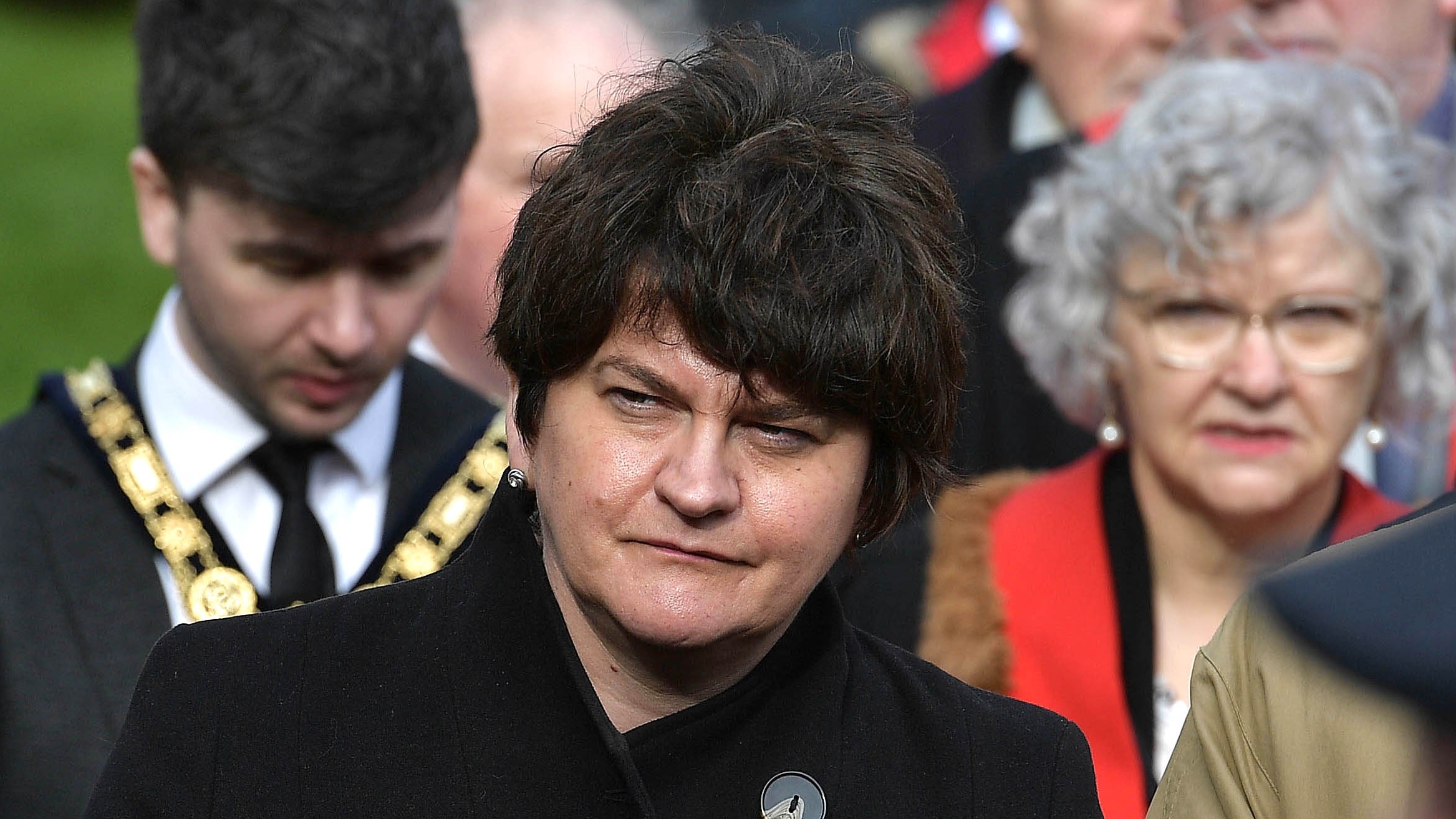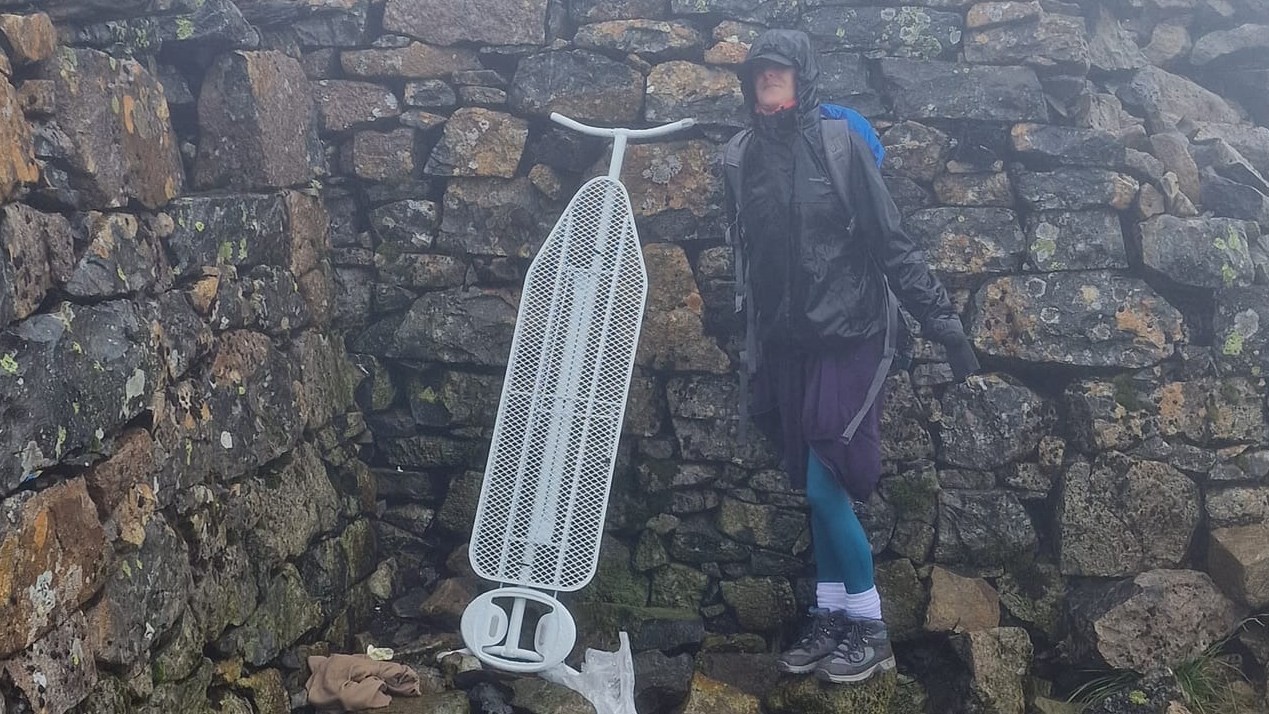‘Arlene Foster’s demise signals we must strengthen pragmatic unionism’
Your digest of analysis and commentary from the British and international press

- 1. Boris Johnson will make Ulster the EU’s problem
- 2. Westminster redecorating could tarnish Johnson’s carefree image
- 3. Scotland’s post-reality politics
- 4. The government dithers and delays, but the UK needs a Covid public inquiry now
- 5. Why haven’t we paid as much attention to the Post Office scandal as we have to Boris Johnson’s flat?
A free daily email with the biggest news stories of the day – and the best features from TheWeek.com
You are now subscribed
Your newsletter sign-up was successful
1. Boris Johnson will make Ulster the EU’s problem
James Forsyth in The Times
on a fragile unionism
“Whenever unionism feels it can’t trust the British government it goes into an angry, pessimistic, almost paranoid state of mind and Arlene Foster felt the brunt of that,” writes James Forsyth in The Times. While she may have been “doomed” by her “ambivalence” on gay conversion therapy, ultimately “the DUP felt it was haemorrhaging votes because its leader had been duped by No. 10” over promises there would be no Irish Sea border. “It needed to staunch the bleeding.” The unionist vote is now split, and Sinn Fein could emerge as the largest party at next year’s Stormont elections. “It is hard to see how power-sharing between unionists and nationalists could survive if Sinn Fein became the largest party,” argues Forsyth. It is therefore “in the interests of London, Dublin and Brussels to strengthen pragmatic unionism: Foster’s demise is a sign of what happens when this is forgotten”.
The Week
Escape your echo chamber. Get the facts behind the news, plus analysis from multiple perspectives.

Sign up for The Week's Free Newsletters
From our morning news briefing to a weekly Good News Newsletter, get the best of The Week delivered directly to your inbox.
From our morning news briefing to a weekly Good News Newsletter, get the best of The Week delivered directly to your inbox.
2. Westminster redecorating could tarnish Johnson’s carefree image
Camilla Cavendish in the Financial Times
on the real national treasure
“British politics currently resembles a whodunnit, with Westminster consumed by one question: who paid to redecorate the prime minister’s Downing Street flat?” writes Camilla Cavendish in the Financial Times. Boris Johnson will not be brought down by “wallpaper-gate” alone, “but if the impression keeps growing that Britain is run by a gilded chumocracy, it could prove toxic at the next election”. “The most damaging aspect may prove to be not the cover-up, but the snub to a national treasure, the John Lewis department store”, Cavendish adds. “To diss John Lewis… is to attack an institution which has served Middle England from cradle to grave.” The store’s “genius is to be faintly upmarket but not flashy, as voters might once have seen Boris”.
A free daily email with the biggest news stories of the day – and the best features from TheWeek.com
3. Scotland’s post-reality politics
John Ferry in The Spectator
on political unrealities
“When the Institute for Fiscal Studies (IFS) uses the word ‘disappointing’ in its press release, you know things are getting serious,” writes John Ferry in The Spectator. That’s how it described the manifestos of Scotland’s three biggest political parties – the Scottish National Party, Scottish Labour and the Scottish Conservatives. According to the IFS, all failed to “provide transparent and comprehensive costings for their plans”. As the IFS makes clear, “the spending commitments are a fantasy. None of the big parties are talking anywhere about cuts or increases in taxes… In this sense they fit perfectly into the groove of contemporary Scottish politics, which exists in a kind of la-la land of unrecognised truths and rehearsed pretences.” Scottish Labour and the Tories know they are merely competing to be the biggest opposition party. “Why not then go all-in on pledges?” Ferry asks. “As for the SNP, they know they can promise the Earth and outsource the blame to Westminster when they later fail to deliver.”
4. The government dithers and delays, but the UK needs a Covid public inquiry now
Marcus Shepheard in The Guardian
on pandemic accountability
“It is time for a public inquiry,” says Marcus Shepheard in The Guardian. “The coronavirus crisis has been an extraordinary period for the UK, and the toll substantial,” he says, but “the lack of an inquiry has created a vacuum in the discourse around the crisis” that has “been filled with a briefing war, and a blame game of anonymous comments and contradictory statements. This is unhelpful and only undermines public confidence.” Shepheard continues: “Accountability matters. Despite what the government says, investigations by the National Audit Office or parliamentary select committees – while all valuable – are no substitute for a public inquiry.” This, he adds, “will not be easy, or quick, but it is vital. The prime minister should act now.”
5. Why haven’t we paid as much attention to the Post Office scandal as we have to Boris Johnson’s flat?
Cathy Newman in The Independent
on overlooked injustice
“Every waking hour, many journalists and politicians in the Westminster bubble are consumed by the prime minister’s Lulu Lytle home furnishings,” writes Cathy Newman in the Independent. “But the scandal which should be keeping us all awake at night is the appalling miscarriage of justice which saw more than 700 Post Office workers wrongly accused of theft, fraud and false accounting.” The coverage of the Post Office debacle “raises uncomfortable questions about the priorities of sections of the media and political classes,” she says. The scandal is “one of the worst miscarriages of justice in British history”, yet “the story has almost entirely disappeared from the front pages and the broadcast news bulletins”. “It’s not that we care too much about allegations of sleaze concerning the prime minister,” Newman adds. “It’s that over the years we appear to have cared too little about allegations which wrecked hundreds of lives. Why?”
-
 The ‘ravenous’ demand for Cornish minerals
The ‘ravenous’ demand for Cornish mineralsUnder the Radar Growing need for critical minerals to power tech has intensified ‘appetite’ for lithium, which could be a ‘huge boon’ for local economy
-
 Why are election experts taking Trump’s midterm threats seriously?
Why are election experts taking Trump’s midterm threats seriously?IN THE SPOTLIGHT As the president muses about polling place deployments and a centralized electoral system aimed at one-party control, lawmakers are taking this administration at its word
-
 ‘Restaurateurs have become millionaires’
‘Restaurateurs have become millionaires’Instant Opinion Opinion, comment and editorials of the day
-
 NHS tells Scots to walk like penguins
NHS tells Scots to walk like penguinsTall Tales Walk like penguins in the snow, says NHS
-
 Woman solves 'rude neighbour' mystery
Woman solves 'rude neighbour' mysteryTall Tales And other stories from the stranger side of life
-
 'Extreme ironing' blamed for Ben Nevis board
'Extreme ironing' blamed for Ben Nevis boardTall Tales And other stories from the stranger side of life
-
 Screaming Beatles fans embarrassed George Harrison’s mother
Screaming Beatles fans embarrassed George Harrison’s motherfeature And other stories from the stranger side of life
-
 Boris Johnson shocks UK by resigning from Parliament
Boris Johnson shocks UK by resigning from ParliamentSpeed Read
-
 First crocodile virgin birth recorded
First crocodile virgin birth recordedfeature And other stories from the stranger side of life
-
 Joggers told to wear helmets amid bird terror
Joggers told to wear helmets amid bird terrorfeature And other stories from the stranger side of life
-
 Bees delay flight for three hours
Bees delay flight for three hoursfeature And other stories from the stranger side of life